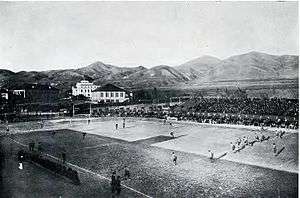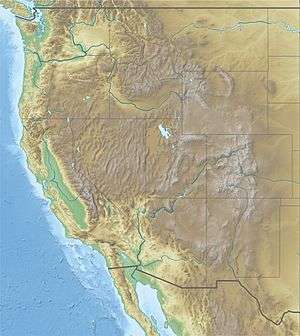Rumble in the Rockies
| First meeting |
October 3, 1903 Colorado, 22–0 |
|---|---|
| Latest meeting |
November 26, 2016 Colorado 27–22 |
| Next meeting |
November 25, 2017 in Salt Lake City |
| Statistics | |
| Meetings total | 63 |
| All-time series | Colorado leads, 32–28–3 (.532) |
| Largest victory | Colorado, 54–0 (1951) |
| Longest win streak |
Colorado, 8 (1951–58) Utah, 8 (1925–33) |
| Current win streak | Colorado, 1 (2016– ) |
The Rumble in the Rockies is an American college football rivalry between the University of Colorado Buffaloes from Boulder and the University of Utah Utes of Salt Lake City. After nearly five decades of dormancy, the rivalry was revived five years ago in 2011, when both joined the Pac-12 Conference.
From 1903 until 1962, Utah and Colorado played each other nearly every year, a total of 57 games.[1] At that time, it was the second-most played rivalry for both teams (Utah had played Utah State 62 times;[2] Colorado had played Colorado State 61 times[3]). After the 1962 meeting, a second consecutive win by Utah, the teams stopped playing each other in football.
As part of the 2010–13 NCAA conference realignment, both Utah and Colorado joined the Pac-12 in 2011 and were placed in its new South Division; they met that year on Black Friday in Salt Lake. The second game since the realignment was at Boulder and was the first Black Friday college football game to be telecast by the Fox Broadcasting Company.
Prior to the resumption of the rivalry, Colorado played Nebraska on Thanksgiving weekend since the formation of the Big 12 Conference in 1996 in front of a national television audience. Before 1996 in the Big Eight, Nebraska traditionally ended its regular season with rival Oklahoma, while CU had no strong conference rivalry and often concluded with Kansas State or Iowa State. Utah traditionally played nearby rival BYU of Provo in the heated Holy War on Thanksgiving weekend; they have met every year since 1946, and all but two years since 1922.
The CU–NU rivalry went on hold when Nebraska joined the Big Ten in 2011, while Utah's game with BYU was moved to mid-September. BYU left the Mountain West Conference to become a football independent in 2011, and joined the West Coast Conference for its other sports.
Despite the near half-century hiatus, the Colorado–Utah rivalry remains the fifth-most played rivalry in Utah's history, and the eighth-most played rivalry in Colorado's history.[4][5]
History
1910–47

For 38 years, Utah and Colorado were members of the same conference. From 1910 to 1937, they both played in the Rocky Mountain Athletic Conference, and were both members of the Mountain States Athletic Conference from 1938 to 1947. Of those 38 seasons, either Utah or Colorado won at least a share of the conference title 27 times (Utah won 12 outright, and 3 shared; Colorado won 11 outright, and 2 shared). The two schools shared the Mountain States Conference title in 1942.
The most notable meetings during this era occurred in 1936 and 1937:
The 1936 match-up may have featured the greatest gridiron performance of Colorado halfback Byron "Whizzer" White. He ran for one TD from scrimmage that day, and threw for another. But the future Supreme Court justice was most dominant on special teams. As the punter, White kept Utah's offense backed up all game. And as a kick returner, he also returned one kickoff and two desperate Utah punts for touchdowns. Although Utah was favored to win, Colorado won 31–7. [6] Utah's lone touchdown in the game was a kickoff return for a touchdown by Joseph Wirthlin.[7]
In 1937, Colorado went into Salt Lake undefeated and unchallenged – having outscored opponents 162–6 en route to a 5–0 record. However, they found themselves trailing Utah at halftime 7–0. But from there, Whizzer White took control of the game. White first got CU on the board with a third-quarter field goal. Then, in the fourth quarter, White returned a Utah punt 95 yards for a touchdown (he also kicked the extra point). Moments later, White sealed the win with a 57-yard touchdown run from scrimmage (and again kicked the extra point). Final Score: Colorado 17, Utah 7.[6][8][9] The Frontiersmen finished the regular season 8–0, but lost to Rice of Houston in the Cotton Bowl in Dallas. White was a runner-up on the Heisman Trophy ballot.[10]
1948–62
In 1948, Colorado left the Mountain States Conference to join the Big Eight Conference (then known as the Big Seven Conference). But for the next fourteen years, Utah and Colorado played each other nearly every year as part of the teams' non-conference schedules. It was during this time, Colorado began to dominate Utah, winning nine of the thirteen games played during this era, including eight in a row from 1949 to 1958.[1]
| 1 | 2 | 3 | 4 | Total | |
|---|---|---|---|---|---|
| Utah | 7 | 7 | 7 | 0 | 21 |
| #8 Colorado | 6 | 0 | 0 | 6 | 12 |
The teams did not meet for two seasons and resumed in 1961 at Folsom Field in Boulder in perhaps the most noteworthy game of the series for two reasons: 1) the 1961 CU team was the most successful squad that either school had ever fielded; and 2) it was a monumental upset. #8 Colorado was the first to score, and they also added another touchdown in the final minutes. But Utah dominated the game in between Colorado's lone scores and won 21–12.[11] Colorado finished the regular season with a 9–1 record, a #4 national ranking, a Big Eight title, and a berth in the Orange Bowl. Utah settled for the rivalry upset win and a 6–4 record.
Utah won again the following year 37–21 in Salt Lake, which was the last meeting for 39 years.
2011–present
With both schools joining the Pac-12 in 2011, the rivalry resumed. The first matchup was a Black Friday game, a day in college football reserved for rivalry matchups; Colorado had a regular place on Black Friday since 1996, against then-division rival Nebraska. The conference realignments separated that rivalry and restarted the long-dormant Colorado–Utah series.
In the inaugural Pac-12 matchup in Salt Lake, Colorado won 17–14 at Rice-Eccles Stadium, ending Utah's chance at a possible berth in the first Pac-12 championship game. Had the Utes won, they would have represented the South Division against eventual conference champion Oregon. Utah got revenge on the Buffaloes the next year, beating Colorado 42–35 in Boulder in a close game.
Utah won again in 2013, defeating the Buffaloes 24–17 in Salt Lake City to ensure that Colorado finished last in the Pac-12 South. The 2014 game was another hard-fought game in Boulder swaying in the Utes favor. Utah won 38–34, as Colorado went winless in conference play. In 2015, Utah won 20–14 in a hard fought match in the snow, which led Utah to a co-championship of the South division.
Game results
| Colorado victories | Utah victories | Tie games |
| ||||||||||||||||||||||||||||||||||||||||||||||||||||||||||||||||||||||||||||||||||||||||||||||||||||||||||||||||||||||||||||||||||||||||||||||||||||||||||||||||||||||||||||||||||||||||||||||||||||||||||||||||||||||||||||||||||||||||||||||||||||||||||||||||||||||||||||||||||||||||||||||||||||||||||||||||||||||||||||||||||||||||||||||
References
- 1 2 "Colorado vs Utah". College Football Data Warehouse. Retrieved 2010-06-19.
- ↑ "Utah vs Utah St.". College Football Data Warehouse. Retrieved 2010-06-19.
- ↑ "Colorado vs Colorado St.". College Football Data Warehouse. Retrieved 2010-06-19.
- ↑ "Utah Opponents". College Football Data Warehouse. Retrieved 2010-06-19.
- ↑ "Colorado Opponents". College Football Data Warehouse. Retrieved 2010-06-19.
- 1 2 Mark Purcell. "Whizzer White: a pop-art icon of the thirties" (PDF). College Football Data Warehouse. p. 13.
- ↑ Mike Sorensen. "Elder Wirthlin cheers on Utes". Deseret News.
- ↑ Jim Campbell. "Colorado Justice.pdf" (PDF). College Football Historical Society Newsletter. p. 15.
- ↑ "White Runs 95 And 57 Yards And Scores All CU Points". CUBuffs.com. Retrieved 2010-06-20.
- ↑ "Winners (1937)". The Heisman Memorial Trophy. Retrieved 2010-06-19.
- ↑ "Inspired Redskins Crush Unbeaten Colorado". Salt Lake Tribune. 12 November 1961.


